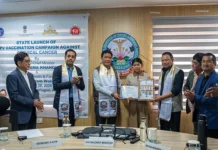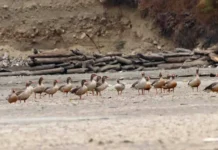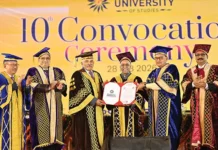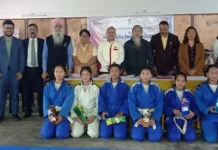[S Mundayoor]
The inevitable has happened. The CBSE on 25 June, 2025 announced that the Class 10 examinations will be held in February 2026. The board had, in the first week of March 2025, sought feedback on the proposal from state governments, schools and individuals, but it is doubtful if there was an active response or review from the stakeholders or the media across the country.
As far as Arunachal’s schools are concerned, the proposal has in effect curtailed one month of serious learning time of our students, as our academic session has just started in June. For the government school students, the academic activities began only on or after 16 June, 2025, with the first half of the month taken up for admissions.
The CBSE announcement has given us one more opportunity to look at the issue and our school academic calendar. Loss of one month of active learning period: isn’t it a blow not only onthe Class 10 government school students but on Arunachal’s entire school education system?
The national media coverage of last week’s CBSE announcement was clearly incomplete, highlightingthat “the students are being provided one more chance to improve their performance.” The fact that it would deprive some students one month of active learning time in states like Arunachal, where the academic session starts only in June, was wholly left out. And that “such students would not have the option of appearing only in the 2nd round of exam in May 2026, instead of the first exam in February.” It thus emerges clear that this change would benefit only a select few – the KV-JNV groups, the metroschools and the CBSE schools in those states where the academic session starts from April.
The issue of how this abrupt change would adversely affect the academic interests of Arunachal’sgovernment schools was pointed out by this writer in March 2025 itself (The Arunachal Times, 6 March, 2025 https://tinyurl.com/23z92k3n). A few others in Arunachal too had appealed to the education department and the state’s elite to take up the issue with the CBSE.
For refreshing the memory of our readers, here are the salient points and why the exam change is prejudicial and not relevant at present to Arunachal’sstudents:
CBSE Class 10 exams will be held from 15 February to 6 March, 2026. The results will be ‘available’ for Class 10 on 20 April, but in DigiLocker, but will not be announced till 30 June. The improvement examination from 5 to 20 May, 2026 is optional, but only for those who have written February exams. Thus, the CBSE assumes that Class 10 admissions “can be completed in April 2026 and session can commence right away.”
But What about the CBSE schools in those states which commence their new academic session in June? The unsuitability of the proposed change for Arunachals’ students can be listed as:
- A majority of Arunachal’s students – 62.6% – are in government schools. (ASER, 2023). The loweducation standards in government schools have been a matter of recurring concerns for the Arunachal government and the state planners. This year the CBSE 10 pass in Arunachals’ schools was reported at 66.33%, whereas the all-India figure was 93.66%; In 2023-24, in Arunachal it was 49.4%. Would reduction of one more month of academic time help improve our CBSE scores?
It should concern all of us also that the latest Performance Grading Index (PGI) 2021-22 for schools released by the Government of India on 19 June, 2025 places Arunachal Pradesh at the bottom in the ‘Akanshi-3’ category.
- CBSE Class 10 written exams if held in February, would also disturb the academic routine of other classes, as these classes are normally cancelled during CBSE 10 and 12 exams.
- The CBSE exam in February would clash with many Arunachal festivals, including our Statehood Day celebrations.
- Academic calendar of our government schools is often disturbed due to the monsoon vagaries. More working days are lost due to other socio-cultural and administrative factors, leading to substantial loss of unhindered ‘learning time’ for students.
- The second exam in May would hardly interest most Arunachal government school students, especially the rural and the marginalised, who would be more concerned to pass well in the first attempt itself. It could appeal only to a small section of students from KV, JNV and private schools; those from financially upper layers and those keen on medical and engineering admissions.
- Most of our rural students stay in school hostels or rented premises far away from their homes. During May exams, school hostels would be closed and staying even a week outside in the exam town would be a financial burden to them, especially for girl students.
- Most rural Arunachal students participate in farm activities at home during April-June vacation. Sadly, there is hardly any academic or reading environment or facilities in our villages. Hence their interest in the May exam will be minimal.
- The second exam in May would also result in several senior subject teachers going on a delayed vacation during June to August, adding to greater academic instability in our government schools.
In short, wouldn’t such an exam change amount to catering only to a few, while depriving thousands of other Arunachal students of an opportunity to have quality learning?
We had therefore suggested that the CBSE exam be first held as a pilot project in metros and by those private schools who do not face similar constraints as Arunachal schools.
It would therefore best serve the interests of Arunachal school education and our students if the state Education Department, our education minister and our state leaders take up the issue with the CBSE and get Arunachal exempted from the new exam plan till the education climate in our state is groomed to benefit from this CBSE reform.
Epilogue: Our state has produced generations of brilliant doctors, engineers, administrators, scholars and leaders. With such a lineage of elites, would it be any issue for Arunachal to evolve our own school education model suiting the socio-cultural heritage and climatic conditions of our state? (The writer is an educational and reading promotion activist, with over 45 years of experience with Arunachali youths, and the coordinator of the Lohit Youth Library Network.)




